Feds OK Wilderness Mining Lease
Air Date: Week of January 5, 2018
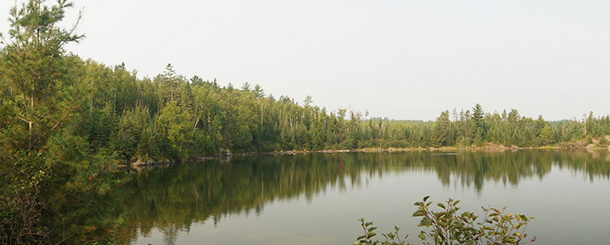
About half of the Boundary Waters Canoe Wilderness Area is covered in water; the rest is dense forest. (Photo: Greg Gjerdingen, Flickr CC BY 2.0)
Minnesota is called “the Land of 10,000 Lakes,” and every year hundreds of thousands of people visit the pristine waters of its Boundary Waters Canoe Wilderness Area, and the Obama Administration had blocked a proposed copper and nickel mine next door. Now the mine is back in play after the Trump Administration reversed the ruling. Democratic Rep. Betty McCollum of Minnesota’s 4th congressional district tells host Steve Curwood that the sulfide ore mining process used to extract copper and nickel is known to pollute waters with acid, arsenic, mercury, and lead.
Transcript
CURWOOD: From PRI, and the Jennifer and Ted Stanley Studios at the University of Massachusetts, Boston, this is Living on Earth. I’m Steve Curwood. If you’ve ever used Scotch Tape you may have noticed that it’s made by 3M, which is an acronym for the Minnesota Mining and Manufacturing Company that began back in 1902. And in this state called the Land of Ten Thousand Lakes, iron mines became big business, though most of them played out years ago. Now there is a move to mine copper and nickel right next to the popular and massive Boundary Waters Canoe Wilderness Area.
Fifty or so years ago copper mine developers leased land next to this crown jewel of wilderness from the government, but never starting mining. And then a few years ago when these Minnesota copper and nickel deposits caught the attention of Antofagasta, a Chilean mining company, and it tried to renew the expired leases the Obama Administration said no -- not without environmental review. And just two days before Christmas a top lawyer for the Trump Interior Department issued a written ruling nixing the review on the grounds that the previous administration had "improperly interpreted the leases,” thus giving a green light to the project.
Antofagasta mining is owned by billionaire Andrónico Luksic who also happens to own a Washington, D.C. mansion he bought right after the 2016 elections and turned over to Ivanka Trump and Jared Kushner to rent as their home. Joining us now is Betty McCollum, Democratic Representative for Minnesota’s 4th congressional District. Rep. McCollum, welcome to Living on Earth!
MCCOLLUM: It's good to be here with you.
CURWOOD: Please, first tell us about the Boundary Waters Canoe Area Wilderness, and why it's so important to your state, including by the way, city dwellers like your constituents down in St Paul?
MCCOLLUM: Well, the Boundary Waters Canoe Wilderness Area’s not just important to everyone in Minnesota. We're so proud that we have a significant wilderness located in our state adjacent to Canada, but it's also one of our nation's US greatest treasures that we have within our responsibility to protect for future generations.
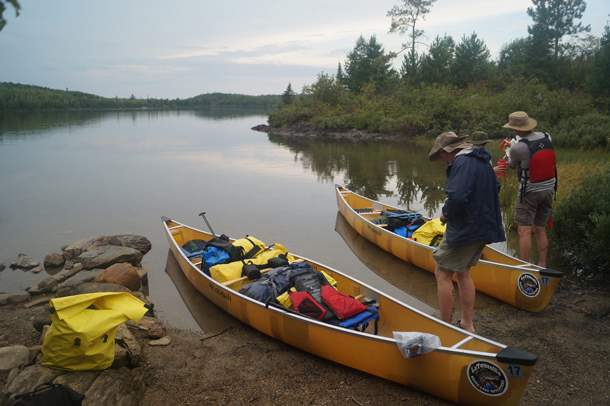
Attracting some 250,000 visitors a year, the Boundary Waters Canoe Wilderness Area contains over 1200 miles of canoe routes. (Photo: Greg Gjerdingen, Flickr CC BY 2.0)
CURWOOD: When was the last time you were there, and how many moose did you see when you were?
MCCOLLUM: [LAUGHS] Well, I didn't see any moose when I was up there, but I am usually up in that neck of the words as we say in Minnesota about once a year. Voyageurs National Park is adjacent to it, so between those two areas I'm up there at least once a year. But the Boundary Waters Canoe Wilderness Area is one million acres of unspoiled woodlands, more than 1,000 pristine lakes that are protected by the US Forest Service, and as you pointed out, they're beloved by people in Minnesota but adventurers, campers, sportsmen and women from all across the country and people from all over the world come visit this wilderness.
CURWOOD: Now, I understand, Congresswoman, that you introduced a bill back in 2015 that would have made federal lands adjacent to the Boundary Waters in the wilderness off limits to mining. Why did you propose to stop heavy metals mining there?
MCCOLLUM: Well, the state of Minnesota, our governor, Governor Mark Dayton, also took state lands and made them unavailable in areas adjacent to the Boundary Waters for mining. And the bill that you refer to in 2015 just prohibited this sulfur ore mining which we know is the most toxic industry for mining in the United States. They pollute waterways with acid drainage that include things like arsenic, mercury and lead. And in 2012 there was a study done of American sulfide ore mines and they found that all of them, every single one of them, leaked. Ninety-two percent of them had experienced failures that negatively affected water quality. So, my bill back in 2015 put a prohibition on that type of mining.
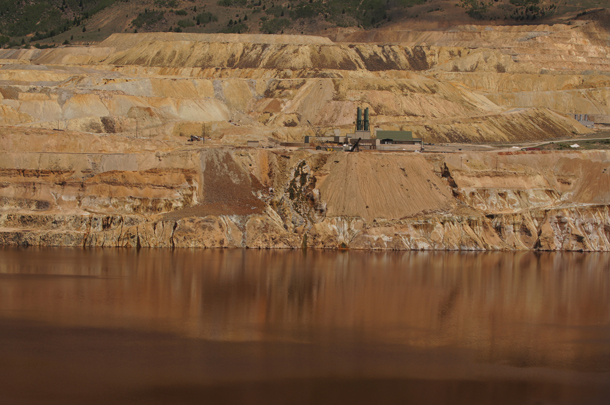
The Berkeley Pit is a former open pit sulfide-ore copper mine located in Butte, Montana that is now filled with heavily acidic water containing arsenic, cadmium, zinc, and sulfuric acid. It’s one of the largest Superfund sites. (Photo: Tjflex2, Flickr CC BY-NC-ND 2.0)
Since then, we've had some changes. The Obama administration wanted to do a two-year study, was taking a time out that there couldn't be any mining leases for 20 years in that area while we really figured out what the potential damage would be from any leakage from these sulfide ore mines, which I mentioned before, they all leak. Since then under the Trump Administration, the Department of Interior, under Secretary Zinke, has renewed these leases which were originally put forward in the 1960s. And so the same royalty payment standards in everything from the ‘60s apply. And if, you know, people who know a little bit about America's bipartisan attempt back in the ‘70s to protect our air and water would know that we need leases that reflect the standards of the Clean Air and Clean Water Act.
CURWOOD: Now, of course, Minnesota is famous for mining. Indeed your big company 3M is, what, Minnesota Mining and Manufacturing. The argument is that these miners can do this right even with the risks, and your response is?
MCCOLLUM: My response is we cannot afford to take a chance on this sulfide ore mining. You know, Minnesota has a proud tradition of taconite mining, and the taconite mining that we do today is through trial and error of learning how to clean up the contamination to our water and to our land with the taconite mining. So, Minnesota has a proud tradition of taconite mining, but right now there is no way forward to do this sulfide ore mining without polluting water.
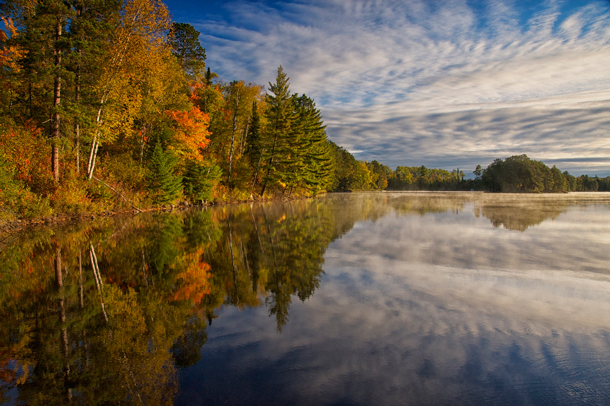
Fall foliage around Farm Lake in the Boundary Waters area. (Photo: Jim Liestman, Flickr CC BY-NC-ND 2.0)
CURWOOD: Talk to me about the type of copper nickel mining operation that is planned to be done there, and where exactly is it in relation to the Boundary Waters Canoe Wilderness Area?
MCCOLLUM: Well, it is adjacent to the Boundary Waters area. So, we're talking about tunneling and mining that are on the shores or tunneling right underneath water that flows back and forth between the Boundary Waters and the non-Boundary Waters. You know, we've all been on the lake, we've all seen maps where there's a dotted line -- go back to your days of geography -- that you know maybe divide a state or in our case, between Canada, the United States and the Boundary Waters. Well, the water doesn't stop. It moves. And so there's no buffer there's no protection that this water, which pollutes, would not do anything but flow north into the Boundary Waters and then eventually into the waters adjacent to Canada. And also through many of our tribal nations’ property as well would be affected with pollution.
CURWOOD: By the way, has Canada raised any objection to this development?
MCCOLLUM: Well, it's been a while since I've had an opportunity to speak to the Canadian government about it. It's on my list to do because this all happened just recently. I've spoken to people from Canada who work in the environmental industry and people who are in the government and they are very concerned because they had a mine similar to the one that's proposed, and there was a huge leak and destroyed acres and acres and acres of timber and wildlife. So, their firsthand experience with this type of mining was, it didn't go very well.
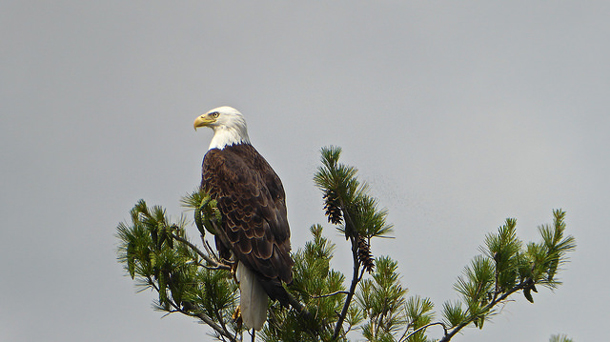
A Bald Eagle perches in nearby Voyageurs National Park (Photo: Fighting Irish 1977, Flickr CC BY 2.0)
CURWOOD: Now, how is the Interior Department under Mr. Zinke justifying the renewal of these mining leases?
MCCOLLUM: Beats me. I mean Secretary Zinke appeared in front of me twice, and I spoke to him as recently as just before the Christmas break, thanking him for moving forward on conducting the study. And every time we've had this discussion in public or in my office, he said, “You know, we need to understand the science on this because the pollution to this water is significant and could be toxic and harmful for hundreds of years”. And then, you know, surprise! Buried in one of the federal documents that come out is a renewal of these leases, and the leases -- if the study had gone forward and we had taken the time out to really understand what was going on, I'm sure these leases, if they would have been moving forward would have been much more stricter standards than the standards in the 1960s. Because after all this is 2018 now!
CURWOOD: What would you like Secretary Zinke to do right now about this?
MCCOLLUM: Well, I would like him to say, “You know, I don't know how this happened, we were talking on the phone. I thought we were going to complete the study”. I'd like him to reverse himself and go back to the study, but somehow or another I don't see that happening in 2018. So, I think this is going to land up unfortunately being in the courts, where it's going to cost US taxpayers a lot more money than to let a thorough research study move forward about the effects of sulfide ore mining. This is going to be a huge loser for the taxpayers as well as for our environment.
CURWOOD: Tell me, what's the reputation as far as you understand it, of Antofagasta, that's the Chilean firm that would develop this copper and nickel mine?
MCCOLLUM: They were just fined recently by their own government for polluting. And as I said, every single one of these sulfide ore mines leak, and so they cannot come in and with any great deal of confidence tell anybody that if they open up this mine -- even as they're do some of the exploratory work that they do -- that there's not going to be any of this pollution, arsenic, mercury and lead into our waters.
CURWOOD: As I understand it, this Chilean firm is owned by the chap who is renting a home in Washington to Jared Kushner and Ivanka Trump. What, if any, relationship do you think there is between the reversal of this lease moratorium and the relationship between the owner and these members of the Trump family?
MCCOLLUM: You know, I'm not aware of anything, but as my grandmother's often told me, “Appearances count for a lot”, and it is a, it's a really bad appearance that there's people in the White House -- the President's daughter and son-in-law -- renting from this company. I would say that this administration has been fraught with conflicts of interest and I would think that they would want to avoid that. So, I know what you know, but as my grandmother says, “it doesn't look good”.
CURWOOD: You know, Representative, I haven't been to the Boundary Waters to canoe. I do that out east. But a lot of people go there. A lot of people like it. I think it's like a quarter million people a year or something, and it's actually a place that if you're in a wheelchair there's accessibility. You can get loaded into a canoe and enjoy the outdoors.
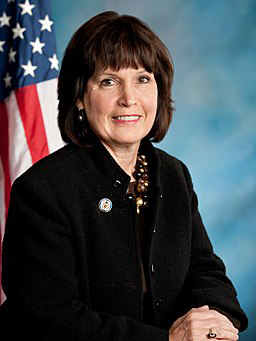
US Rep. Betty McCollum serves Minnesota’s 4th District, in St. Paul. (Photo: US House Office of Photography, public domain)
MCCOLLUM: There are a couple of motorized portages available. We've tried to make all of our parks, all of our national lands accessible to the public. But I also want to just, you know, point out -- there's another wilderness area in the United States is under attack from this administration, that's ANWR, that's the Arctic National Wildlife [Refuge]. In the tax bill, they've opened that up to drilling. In our national parks, there's talk about opening up uranium mining adjacent to national forest lands in the Grand Canyon's watershed. So, it really appears that our public lands are up for sale. And our responsibility -- that I take very seriously as a ranking member on the subcommittee of Interior Appropriations -- is to make sure that we leave some areas for future generations, whether it's our national parks with accessibility, or these very special places like ANWR or the Boundary Waters Canoe Area. We have a responsibility to leave that for future generations, just as generations left that for us, and that is a very sacred trust that usually members of Congress fight very hard to protect. We have a history of trying to make sure that our public lands remain free and open to all of the public to enjoy and that they're just not up for sale.
CURWOOD: Representative Betty McCollum serves Minnesota's fourth US Congressional district from St Paul, Minnesota. Thank you so much for taking the time.
MCCOLLUM: All the best to you, and Happy New Year.
CURWOOD: We asked the Interior Department for further explanation of its decision, but we received no response by our deadline.
Links
About the Boundary Waters Canoe Wilderness Area
Rep. McCollum’s statement on decision to reinstate the mining leases
The Department of Interior document explaining why the leases can be renewed
Living on Earth wants to hear from you!
Living on Earth
62 Calef Highway, Suite 212
Lee, NH 03861
Telephone: 617-287-4121
E-mail: comments@loe.org
Newsletter [Click here]
Donate to Living on Earth!
Living on Earth is an independent media program and relies entirely on contributions from listeners and institutions supporting public service. Please donate now to preserve an independent environmental voice.
NewsletterLiving on Earth offers a weekly delivery of the show's rundown to your mailbox. Sign up for our newsletter today!
 Sailors For The Sea: Be the change you want to sea.
Sailors For The Sea: Be the change you want to sea.
 The Grantham Foundation for the Protection of the Environment: Committed to protecting and improving the health of the global environment.
The Grantham Foundation for the Protection of the Environment: Committed to protecting and improving the health of the global environment.
 Contribute to Living on Earth and receive, as our gift to you, an archival print of one of Mark Seth Lender's extraordinary wildlife photographs. Follow the link to see Mark's current collection of photographs.
Contribute to Living on Earth and receive, as our gift to you, an archival print of one of Mark Seth Lender's extraordinary wildlife photographs. Follow the link to see Mark's current collection of photographs.
 Buy a signed copy of Mark Seth Lender's book Smeagull the Seagull & support Living on Earth
Buy a signed copy of Mark Seth Lender's book Smeagull the Seagull & support Living on Earth

